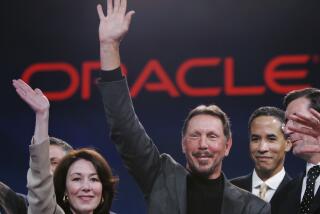Oracle Upbeat Despite Sector’s Profit Warnings
- Share via
REDWOOD CITY, Calif. — Oracle Corp. executives said Wednesday that their company wasn’t suffering the sales shortfalls cited by some software industry rivals last week, and Chief Executive Larry Ellison cited the spate of profit warnings as vindicating his predictions of imminent consolidation.
“We started off very well in the first quarter,” said Chairman Jeff Henley at the annual gathering of investors and analysts at Oracle’s glass-walled headquarters. “I don’t get a sense that things are slowing down.”
As in the past, Ellison was happy to discuss the misfortunes of others.
“Please don’t print it, but I’d like to say, ‘I told you so,’ ” Ellison said at the daylong meeting. “The idea that we need all these different software companies is a very bizarre idea.”
Faced with slowing growth and competition from IBM Corp. and Microsoft Corp. in its core database business, Oracle has changed its strategy and started trying to acquire other companies.
The Justice Department is trying to head off Oracle’s unusual hostile tender offer for PeopleSoft Inc., and Ellison testified last month that he was weighing other significant purchases as well.
“In an era of consolidation, being located in Silicon Valley is an advantage,” Ellison said. “We’ll have an opportunity to buy several companies that are right next to us -- some of them run by [former] Oracle people.” Ellison said those companies were in addition to Pleasanton, Calif.-based PeopleSoft, but he did not give any names.
Ellison said that the recent sales and profit warnings had shaken boards of directors in the area and that the industry would consolidate “like the railroads.”
“We think this is the dawn of the Information Age, not the end of it,” he said, touting his vision of the future of computing, which involves consolidated databases running on clusters of cheap computers.
Executives said Oracle was already benefiting from a shift to that architecture and away from software running on one powerful machine.
Frequently, such clusters run the free operating system Linux, which Oracle has embraced. In Australia, one executive said, 90% of Oracle’s sales of new business management programs are being used on Linux.
The continuing fight to acquire PeopleSoft, one of Oracle’s two main rivals for such programs for handling financial and other business tasks, hung over the meeting.
Oracle has been emphasizing those applications as database growth has ebbed, but it was sidetracked by the pursuit of PeopleSoft.
“The applications business in the last couple of quarters has not quite lived up to what we’ve seen previously,” Goldman, Sachs & Co. analyst Rick Sherlund said.
During a panel presentation by business partners who consult, sell or add services to Oracle products, one conceded that the fight had helped the third big company in the market, SAP of Germany.
David Cooke, who is in charge of consulting firm CapGemini’s Oracle business, acknowledged that Oracle’s applications sales increases had shrunk and that SAP had “taken advantage of that in some places.”
But Oracle executives said the company had been gaining database or applications revenue -- or expected to soon -- in areas including healthcare, military operations and radio frequency identification, the emerging system for tags tracking inventory in retail and other industries.
More to Read
Inside the business of entertainment
The Wide Shot brings you news, analysis and insights on everything from streaming wars to production — and what it all means for the future.
You may occasionally receive promotional content from the Los Angeles Times.










